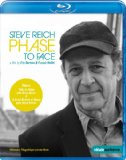| Reviews & Columns |
|
Reviews DVD TV on DVD Blu-ray 4K UHD International DVDs In Theaters Reviews by Studio Video Games Features Collector Series DVDs Easter Egg Database Interviews DVD Talk Radio Feature Articles Columns Anime Talk DVD Savant Horror DVDs The M.O.D. Squad Art House HD Talk Silent DVD
|
DVD Talk Forum |
|
|
| Resources |
|
DVD Price Search Customer Service #'s RCE Info Links |
|
Columns
|
|
|
Steve Reich: Phase to Face

My glancing familiarity with modernist/minimalist composer Steve Reich comes from the same place as my no-less-glancing familiarity with a host of other classical and neoclassical composers, from Bach to Chopin to Arvo Pärt: the movies (with specific respective thanks to Hannah and her Sisters, Autumn Sonata, and Heaven). I recognize Reich's name because, as one of the best-known modern composers, it's mentioned virtually any time I read anything about non-pop contemporary music, but I've only ever heard his work when it was commissioned as the score for a film, in Reich's case by director Craig Lucas, as the score for Lucas's film The Dying Gaul. As is the case with his contemporary Phillip Glass, however, Reich's film music is markedly more accessible and melodic--"conventional"--than the music that got him known, so a closer look is in order if one wants to know what he's about, and that's what Eric Darmon and Franck Mallet's 2009 documentary Steve Reich: Phase to Face, made in 2009 for French television, sets out to provide.
The program opens with a career-capping event for which the filmmakers serendipitously happened to be present: Reich's receiving word that he's just won the Pulitzer Prize for music. That phone call was an interruption in their lengthy, in-depth sit-down interview with Reich at his home in spring of 2009, which comprises much of the film's footage and captures Reich recounting the long and adventurous path of his life and work. The interview was held amidst a flurry of international performances of Reich's works by various orchestras and ensembles, as well as the composition of a new work, 2x5, and footage of these preparations for (including hands-on collaboration with Reich) and performances of a generous retrospective summation of Reich pieces going all the way back to his 1965 breakthrough, It's Gonna Rain, is intercut with his thoughts on their origins, inspirations, and meanings, as well as the fraught, philosophical process of creating them.

Reich is a humble, erudite, surprisingly elderly man (a relaxed, youthful 72 in a baseball cap; what happened to my lazy, stereotypical image of all avant-gardists looking like Dieter from "Sprockets"?), and his approach, both in the interview and in his collaborative work with musicians as seen in the rehearsal footage, makes for an amiable, fast-moving hour. The one thing that goes amiss, strangely enough, is Darmon and Mallet's misguided attempt to make the proceedings more "visual" or cinematic. They evidently felt that their for the most part clean, straightforward, perfectly appropriate documentary style was too bland, because they make the same mistake that Rob Epstein and Jeffrey Friedman did when they saw fit to interject some second-rate animated interpretation of Allen Ginsberg's Howl into their otherwise well-done Ginsberg biopic of the same name, nearly ruining it: they have chosen to create and include obtrusive, literal-minded, and/or corny visual accompaniments for some of Reich's music, when footage of the performances themselves (or, in one case, a remarkable dance piece choreographed to his 1967 work Piano Phase) were entirely sufficient and much more dignified.
That one, not too frequently occurring misstep aside, Phase to Face makes for a serious, fairly thorough, but not intimidating primer for the uninitiated. Regardless of whether or not you know the first thing about Reich's music, music in general, music history, music theory, etc.--all the things Reich knowledgeably touches upon--it works well and is worthwhile as a nicely down-to-earth, graspable introduction that will make you familiar enough with the composer, his ideas, and his music to follow along with Reich-centered articles and (if you happen to move in higher-brow and/or less abashedly pretentious circles than my immediate one) discussions.
THE DVD:
The MPEG-2, 1080/60p transfer (at a 1.78:1 aspect ratio) does just fine by the program's digital videography; the transferred images perfectly reproduce the bright clarity of the DV format.
Sound:The uncompressed PCM stereo soundtrack is excellent, fidelity-wise, especially when it comes to the music. My one complaint would be the sometimes huge discrepancy between interview and performance volumes; I had to adjust my volume settings when the program moved from Reich's voice to various performances and back again, though this may have been an unavoidable contrast.

Two bonus interviews: "Talks in Tokyo with Steve Reich" has the composer fielding questions from a Tokyo audience, some of whom are participants in a musical competition Reich is judging; and "A Brief History of Music by Steve Reich," an excerpt from the main interview of the program in which Reich actually does, in about nine minutes, run through all the major points (as he sees them) of Western music, offering interesting analysis and opinion along the way.
The accompanying booklet features an essay and "tour diary" by co-director Franck Mallet, which gives a thumbnail overview of Reich's career and some detailed context for the performances that we've seen excerpted in the program.
FINAL THOUGHTS:You don't have to be an expert or a prior--or even future--Steve Reich aficionado to take something away from Phase to Face. (I will admit, even after watching and feeling entertained and enlightened by it, I still remain much more partial to Arvo Pärt when it comes to this kind of thing, and I still don't quite see the point of the arch, rarefied not-quite-pop, not-quite-classical musical limbo Reich seems to occupy.) Reich is a congenial and open enough personality--and the film succinctly and astutely enough put together--that even if you're not converted to Reich fandom by it, it's a diverting, informative, and enjoyable enough way to expand your frame of reference and gain some insight into a prominent and influential cultural figure. Recommended.
|
| Popular Reviews |
| Sponsored Links |
|
|
| Sponsored Links |
|
|
| Release List | Reviews | Shop | Newsletter | Forum | DVD Giveaways | Blu-Ray | Advertise |
|
Copyright 2024 DVDTalk.com All Rights Reserved. Legal Info, Privacy Policy, Terms of Use,
Manage Preferences,
Your Privacy Choices | |||||||













